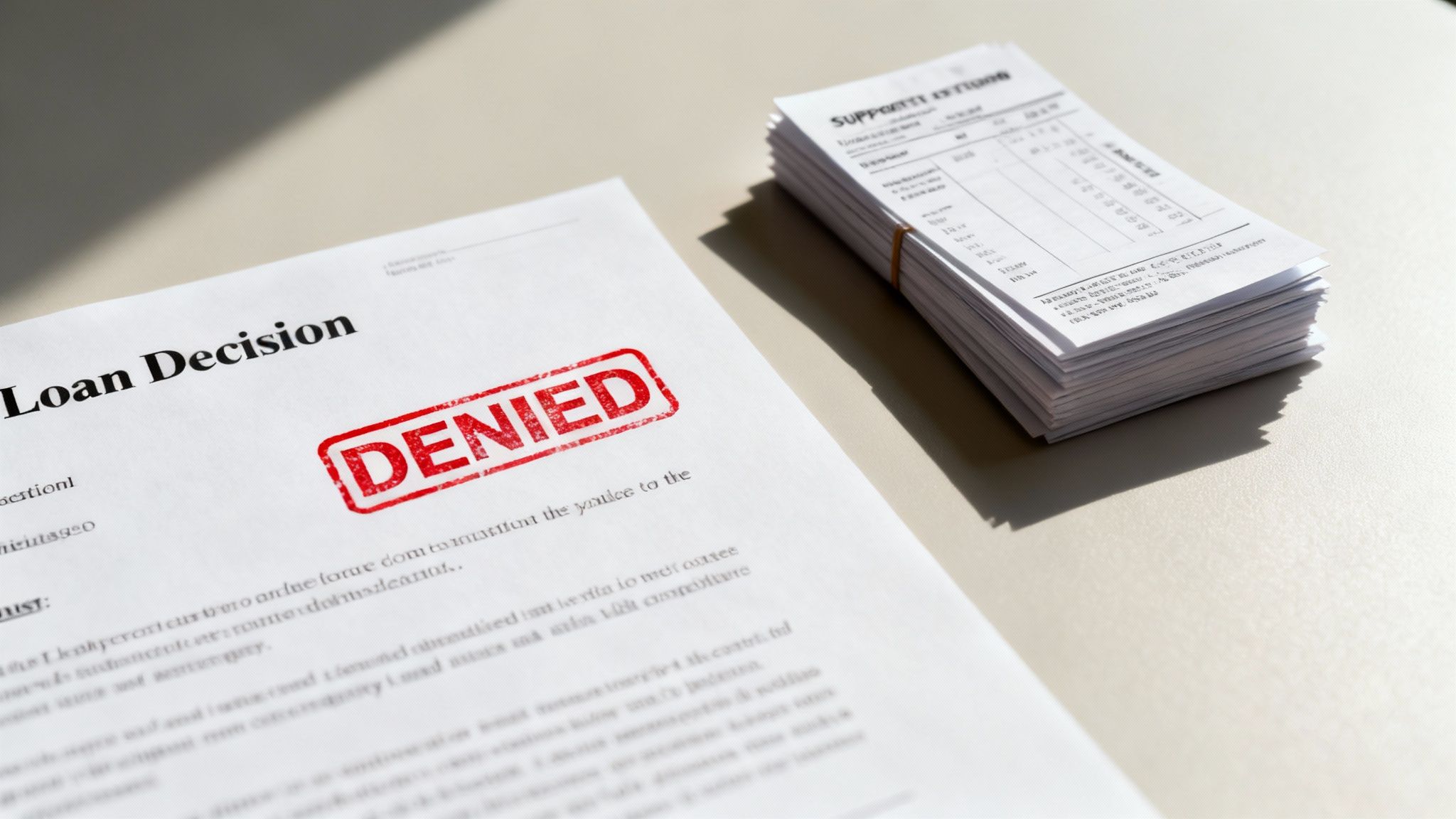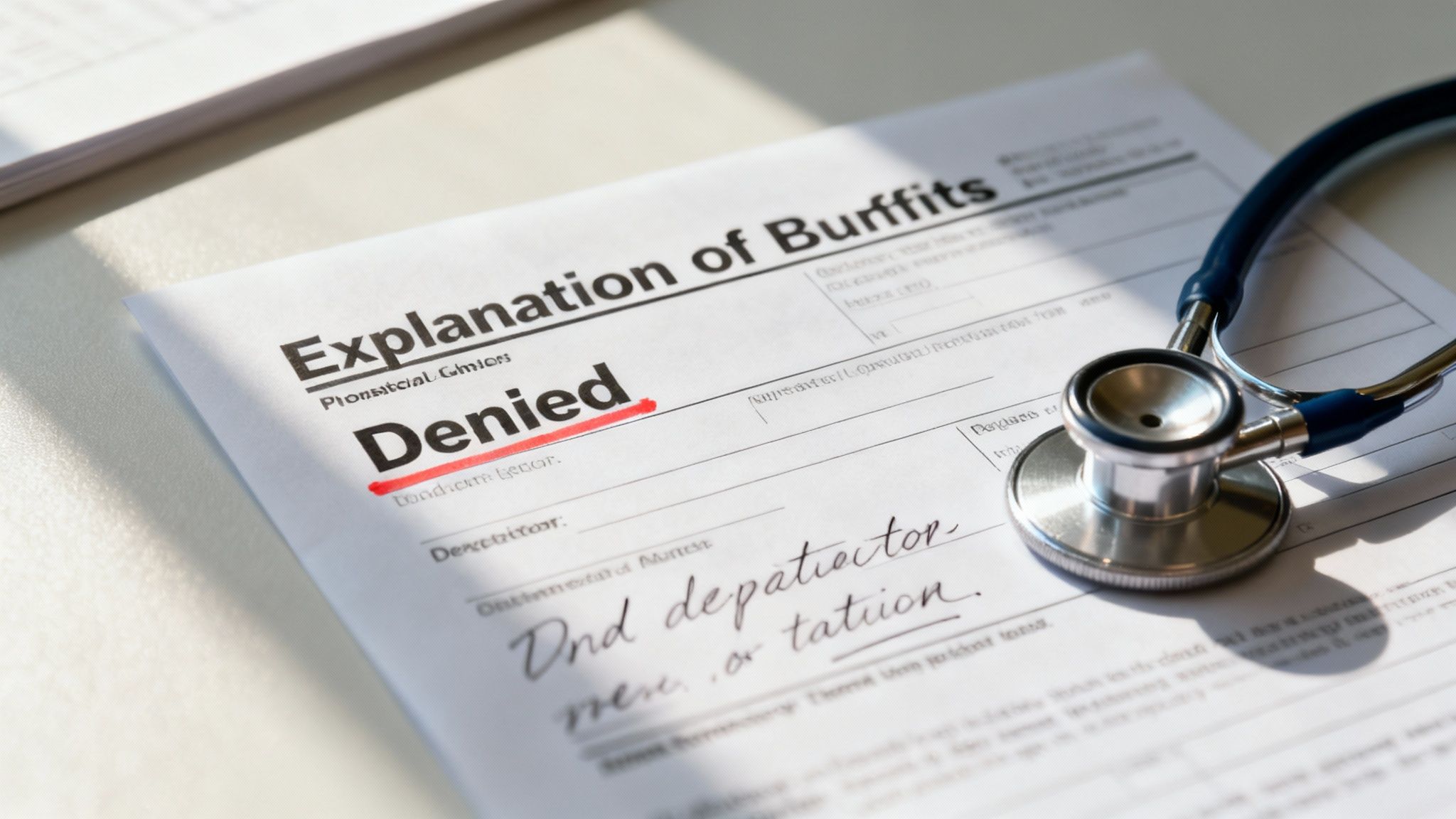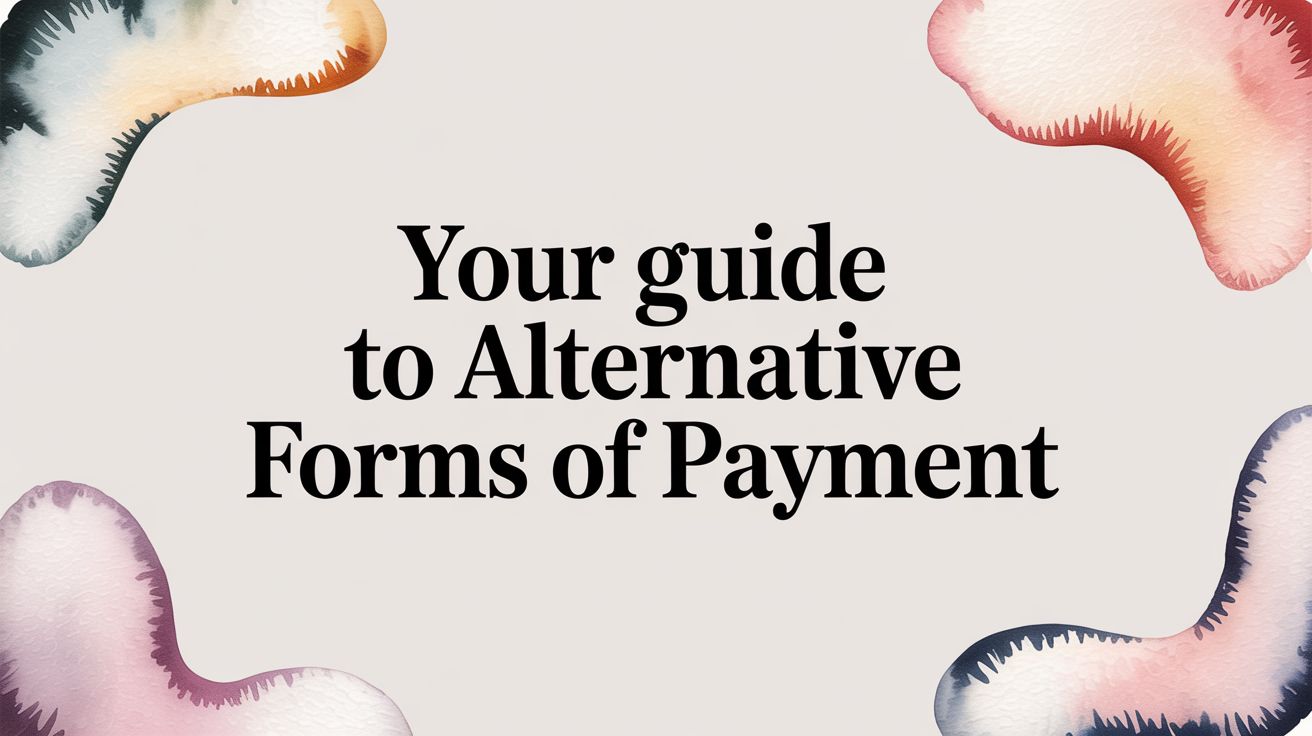
Facing a decision you disagree with can feel overwhelming, whether it’s an unfair performance review, a denied insurance claim, or a grade that doesn’t reflect your work. The good news is, you have the power to respond effectively. A well-crafted rebuttal letter is your best tool for formally challenging a decision and presenting your side of the story with clear facts and compelling evidence.
But staring at a blank page can be intimidating. Where do you even begin? What tone should you use? What information is essential? This guide is here to remove that uncertainty by giving you a collection of powerful rebuttal letter samples.
We've gathered eight high-impact examples covering common real-life situations, from academic appeals to professional disciplinary actions. More than just templates, we'll break down exactly what makes each one work. We will analyze the strategy, highlight the key phrases, and offer actionable tips you can apply immediately. Our goal is simple: to give you the confidence and the tools to write a persuasive rebuttal and get the resolution you deserve. Let's dive into the examples.
1. Academic Grade Appeal Rebuttal Letter
An academic grade appeal letter is a formal document a student writes to a professor or academic committee to dispute a grade. You’d use this kind of rebuttal when you believe your work was graded unfairly, there was a calculation error, or the grading criteria weren't applied correctly. It's a structured way to present your case logically and professionally.
The core strategy is to move the conversation from an emotional reaction ("I deserve a better grade") to an objective, evidence-based discussion ("The rubric states X, my work demonstrates Y, resulting in a discrepancy"). This approach makes it one of the most effective rebuttal letter samples because it relies on clear evidence rather than subjective feelings.
Strategic Breakdown
- Objective Tone: Keep a respectful and calm tone. Avoid accusatory language like "You graded this unfairly." Instead, use neutral phrasing such as, "I am writing to request a review of my grade, as I believe there may be a discrepancy based on the course rubric."
- Evidence is Key: Your argument is only as strong as your proof. Gather all relevant documents: the course syllabus, the assignment instructions, the grading rubric, and the graded work itself. If possible, include examples of previous assignments where you met the standard.
- Focus on Facts: Pinpoint the exact area of disagreement. Was a calculation incorrect? Was a specific section of the rubric misinterpreted? Clearly state the issue without generalizing.
Pro-Tip: Before writing, always ask for a meeting with your instructor to discuss the grade. This can often resolve the issue without a formal appeal and shows you're proactive and respectful of the process.
Actionable Takeaways
- State Your Goal Clearly: Begin by stating the letter's purpose, the specific assignment, and the grade you are appealing.
- Present Your Case: In the body of the letter, use your collected evidence to build a logical argument, referencing the syllabus or rubric directly.
- Propose a Solution: Conclude by suggesting a specific, reasonable resolution, such as a regrade of the assignment or a meeting to discuss the discrepancies further.
For more guidance on structuring your argument, you can find a helpful template in this detailed guide to crafting an academic grade appeal rebuttal letter on chargepay.ai.
2. Performance Review Rebuttal Letter
A performance review rebuttal letter is an employee's formal written response to a performance evaluation. This document is used when an employee disagrees with the feedback, ratings, or conclusions in their review and wishes to provide their own perspective, correct inaccuracies, and ensure their side of the story is officially recorded in their personnel file.
The main goal is to shift the narrative from a one-sided assessment to a balanced record. Instead of an emotional reaction like "My review is unfair," the rebuttal provides a factual counterpoint such as, "The review states a deadline was missed, but fails to account for the resource constraints and project scope changes that were previously approved." This makes it one of the most important rebuttal letter samples for managing your career.
Strategic Breakdown
- Professional and Factual Tone: Your tone should be calm, objective, and professional. Avoid emotional or defensive language. Instead of saying, "You're wrong about my teamwork skills," frame it as, "I would like to provide additional context regarding my contributions to the Q3 project team."
- Data-Driven Arguments: A strong rebuttal is built on concrete evidence, not feelings. Gather emails, project reports, sales figures, client testimonials, or any documentation that supports your claims and contradicts the negative feedback.
- Acknowledge and Address: It’s effective to acknowledge any valid points in the review. This shows you are open to feedback. From there, you can professionally address the specific points you dispute with your evidence.
Pro-Tip: Before writing, request a follow-up meeting with your manager to discuss the points of disagreement. A direct conversation can sometimes clear up misunderstandings and may even lead to an adjustment of the review without a formal rebuttal.
Actionable Takeaways
- State Your Purpose: Begin by clearly stating that the letter is a formal rebuttal to your performance review dated [Date]. Mention your name, title, and the review period.
- Address Points Systematically: Go through the review point-by-point. Use bullet points or numbered lists to address each specific inaccuracy, providing your evidence and explanation for each.
- Request a Resolution: Conclude by respectfully requesting that your rebuttal letter be attached to the original performance review in your official personnel file to ensure a complete and accurate record.
To see how to structure this effectively, explore the detailed guide on drafting a performance review rebuttal letter on chargepay.ai.
3. Disciplinary Action Rebuttal Letter
A disciplinary action rebuttal letter is a formal document an employee writes to their employer to contest a disciplinary measure, such as a written warning, suspension, or termination. You’d use this letter when you believe the action was unjust, based on inaccurate information, or excessive for the alleged infraction. It serves as an official record of your side of the story for your personnel file.
The main strategy is to counter the employer's claims with factual evidence and a professional, non-confrontational narrative. Instead of an emotional response like, "This is completely unfair and you're targeting me," the letter presents a logical case: "The disciplinary report cites attendance issues on these dates, but my attached doctor's notes confirm these were pre-approved medical absences." This makes it one of the most vital rebuttal letter samples for protecting your employment record.
Strategic Breakdown
- Remain Professional: Your tone is critical. Avoid emotional language, blame, or accusations. The goal is to present your case calmly and logically, showing you are a reasonable and professional employee seeking a fair resolution.
- Stick to the Facts: Your rebuttal should be built on verifiable facts, not opinions or feelings. Gather all relevant documentation, such as emails, attendance records, witness statements, or company policy documents that support your position.
- Reference Company Policy: A powerful argument often involves showing how the disciplinary action was inconsistent with established company policy. For example, "The employee handbook states X procedure for this situation, which was not followed in my case."
Pro-Tip: Before writing, carefully review your company's employee handbook and any specific policies related to disciplinary actions and grievance procedures. This ensures your response lines up with the official process.
Actionable Takeaways
- Clearly Identify the Issue: Begin by referencing the specific disciplinary action you are contesting, including the date it was issued and the reasons provided by the employer.
- Provide a Counter-Narrative: Systematically address each point or allegation made in the disciplinary notice. For each point, present your evidence and explain why the action was unwarranted or incorrect.
- Propose a Desired Outcome: Conclude by stating what you hope to achieve. This could be the removal of the warning from your file, a reversal of the suspension, or a formal meeting with HR and management to discuss the matter.
To ensure your letter is structured correctly, you can find helpful advice in this guide on the proper rebuttal letter format on chargepay.ai.
4. Loan Denial or Credit Decision Rebuttal Letter
A loan denial or credit decision rebuttal letter is a formal document written by a borrower to a lender to challenge a negative credit decision. This could be a denied loan application, an increased interest rate, or other unfavorable terms. This letter is a crucial tool for correcting inaccuracies or providing context that automated underwriting systems may have missed, giving you a second chance at approval.

The primary strategy is to directly address the lender's specific reasons for denial with clear, factual evidence. It turns your application from a set of numbers into a human story, explaining things like a temporary income dip during a job change or proving that a negative item on your credit report is an error. Among rebuttal letter samples, this one is powerful because it lets consumers advocate for their financial standing.
Strategic Breakdown
- Address Every Point: Lenders are required to provide an "adverse action notice" explaining their decision. Your letter must systematically counter each reason cited, whether it’s your debt-to-income ratio, credit history, or employment stability.
- Provide Verifiable Proof: Your claims are only as good as the documents backing them up. If you're disputing a credit report error, include a copy of the corrected report. If you're explaining income, provide recent pay stubs or a letter from your employer.
- Maintain Professionalism: Avoid emotional or demanding language. Your goal is to persuade the underwriter to reconsider, not to start a conflict. Frame your letter as a request for re-evaluation based on new or clarified information.
Pro-Tip: Before writing, pull your credit reports from all three major bureaus (Equifax, Experian, and TransUnion). Lenders may use different reports, and you need to see exactly what they saw to build an effective rebuttal.
Actionable Takeaways
- Reference the Application: Start by clearly identifying yourself, the date of your application, and the specific loan you applied for. This helps the lender quickly locate your file.
- Build a Fact-Based Case: For each reason for denial, dedicate a paragraph to explaining the situation and presenting your counter-evidence. For example, "The notice mentioned a recent late payment; attached is documentation showing this was a bank error that has since been corrected."
- Request a Specific Outcome: End the letter by formally asking the lender to reconsider your application based on the provided information. Be direct and state your desired outcome clearly.
5. Medical Insurance Claim Denial Rebuttal Letter
A medical insurance claim denial rebuttal letter is a formal document a patient or healthcare provider writes to an insurance company to appeal a denied claim. This type of rebuttal is essential when a claim for medical services is rejected, and you believe the decision was incorrect due to a misinterpretation of the policy, billing errors, or a dispute over medical necessity. It’s a crucial step in advocating for proper healthcare coverage.

The core strategy here is to turn a frustrating denial into a structured, evidence-backed appeal. Instead of an emotional plea ("I need this covered"), your letter should present a factual argument ("The denial reason X is invalid based on policy section Y and the attached medical records"). This approach is one of the most vital rebuttal letter samples because it directly addresses the insurer’s stated reasons for denial with concrete proof.
Strategic Breakdown
- Formal and Factual Tone: Your tone should be firm, professional, and respectful. Avoid emotional language. State your case clearly, referencing your policy number, claim number, and the date of service.
- Leverage Documentation: This is the most important part of your appeal. Gather the denial letter, the Explanation of Benefits (EOB), your complete medical records for the service, and a letter of medical necessity from your doctor.
- Reference Specifics: Don't just say the denial was wrong. Pinpoint the exact reason for denial cited by the insurer and counter it directly with evidence from your policy documents or supporting medical literature. To effectively draft your rebuttal, it's helpful to understand the common insurance claim denial reasons that lead to such situations.
Pro-Tip: Always call the insurance company first to clarify the denial reason. Sometimes, a simple clerical error or a missing code can be fixed over the phone, saving you from writing a formal letter.
Actionable Takeaways
- State Your Purpose Immediately: Open your letter by clearly identifying yourself, the patient (if different), your policy number, and the specific claim you are appealing.
- Build Your Argument Systematically: Dedicate a paragraph to each point. Explain why the denial was incorrect, referencing specific policy language and attaching supporting documents like doctor's notes or test results.
- Request a Clear Outcome: Conclude by explicitly stating what you want to happen. This is typically a request to re-evaluate and approve the claim for payment.
To see a structured example, you can learn more about crafting a powerful medical claim denial letter on chargepay.ai.
6. College Application Rejection Rebuttal Letter
A college application rejection rebuttal letter, often called a letter of continued interest or appeal, is a document a student submits after receiving a rejection or waitlist notification. It's used to ask the admissions committee to reconsider its decision, but only when there is significant new information to present that was not included in the original application. This isn't about disagreeing with the decision; it's about providing a compelling update.
The purpose is to show your continued strong interest and prove that you've achieved something substantial since applying. For instance, a student might share a major award win, a significant improvement in grades, or a new leadership role. This type of rebuttal letter sample is a long shot but can be effective for students on the waitlist or those with a genuine, game-changing update to their profile.
Strategic Breakdown
- Respectful and Gracious Tone: Your tone is critical. Never criticize the admissions decision or sound demanding. Frame your letter as a respectful request for reconsideration based on new developments, and thank the committee for their time and initial review.
- Focus on New Information: This is not a chance to re-state your original application. The letter’s power comes from presenting new, impactful information. Vague statements or minor updates will not be persuasive.
- Reiterate Genuine Interest: Clearly and specifically state why you believe the university is the perfect fit for you. Mention specific programs, professors, or opportunities that align with your goals to show your interest is authentic and well-researched.
Pro-Tip: Before writing, always check the university's admissions website for their official policy on appeals. Many institutions have specific procedures or explicitly state they do not accept them. Following instructions is the first sign of a great candidate.
Actionable Takeaways
- Verify the Process: Confirm the school’s policy on appeals. If they don’t accept them, sending a letter can reflect poorly on your ability to follow directions.
- Highlight Substantial Updates: Begin by stating your purpose clearly and immediately introduce the new information. For example, "Since submitting my application, I was elected president of the student body and have raised my GPA from 3.8 to 3.9."
- Keep it Concise and Professional: The letter should be brief, ideally no more than one page. Conclude by politely requesting a second look at your application and reaffirming your enthusiasm for the institution.
To see how to frame this type of request effectively, you can find more insights in this guide to writing an example of a rebuttal letter on chargepay.ai.
7. Traffic Ticket or Parking Citation Rebuttal Letter
A traffic or parking citation rebuttal letter is a formal written statement sent to a traffic court or municipal authority to contest a violation. This document is used when a driver believes a ticket was issued in error, due to a malfunctioning device, unclear signage, or other extenuating circumstances. It serves as your official first step in legally challenging the citation.
The goal is to shift the burden of proof from your word against the officer's to a fact-based argument. By presenting verifiable evidence, you change a subjective situation ("I wasn't speeding") into an objective one ("My vehicle's GPS data shows I was traveling below the speed limit"). This evidence-first approach makes it one of the more compelling rebuttal letter samples for legal matters.
Strategic Breakdown
- Formal and Factual Tone: Your letter must be respectful and free of emotion. Avoid blaming the officer or making dramatic claims. Stick to the facts of the incident, presenting them clearly and concisely. For example, instead of "The sign was impossible to see," write, "The parking sign at this location was obscured by a tree branch, as shown in the attached photograph."
- Compelling Evidence: The strength of your rebuttal depends entirely on your proof. This can include dated photographs of the scene (e.g., a hidden sign or a faded curb), GPS data logs, dashcam footage, witness statements, or records showing a meter was faulty.
- Cite the Law: If possible, reference the specific vehicle code or local ordinance you are accused of violating. Pointing out how the circumstances of your citation do not meet the legal definition of the violation adds significant weight to your argument.
Pro-Tip: Always request the officer's notes or the full police report before writing your letter. This documentation can reveal inconsistencies or a lack of detail that you can use to build a stronger case for dismissal.
Actionable Takeaways
- State Your Plea: Begin by clearly stating your intent to plead "not guilty" and request a dismissal of the citation, referencing the specific ticket number.
- Narrate the Facts: Methodically lay out your version of events in a chronological, easy-to-follow narrative. Refer to your evidence as you present each point in your argument.
- Request a Specific Outcome: Conclude by formally requesting that the citation be dismissed based on the evidence provided. If a dismissal is not granted, you can request a reduction of the fine or an in-person hearing.
8. Professional Licensing or Certification Denial Rebuttal Letter
A professional licensing or certification denial rebuttal is a formal, high-stakes document written to a governing board to appeal a decision to deny, suspend, or revoke professional credentials. This type of letter is crucial for professionals like doctors, lawyers, or nurses whose careers depend on their licensure. It's used to challenge allegations, present new evidence, or argue that the board's decision was based on flawed information.
The core strategy is to change the narrative from a punitive action to a story of misunderstanding, remediation, or rehabilitation. Instead of a defensive denial ("I didn't do it"), the letter presents a meticulously documented, evidence-backed case ("The allegation is based on X, but the complete record shows Y, and I have since completed Z remediation steps"). These rebuttal letter samples are among the most complex because of the legal and professional consequences involved.
Strategic Breakdown
- Legal Foundation: This is not a simple letter; it's a quasi-legal document. The first step should always be to hire an attorney specializing in professional licensing defense. They understand the board's procedures, evidentiary rules, and how to frame an argument that resonates with regulators.
- Address Every Point: Your response must systematically address each specific allegation or reason for denial cited by the board. Use their own investigation file to build your counter-argument, pointing out inconsistencies or providing context they may have missed.
- Focus on Rehabilitation: If the denial is based on a past mistake or violation, the focus must be on showing rehabilitation. Document all remedial actions, such as continuing education, therapy, or ethics courses. Strong character references from respected peers can be incredibly persuasive.
Pro-Tip: Time is critical. Licensing boards have strict, non-negotiable deadlines for filing appeals. Contact a licensing attorney and request the complete investigative file from the board the moment you receive a notice of adverse action.
Actionable Takeaways
- State the Purpose and Request: Begin by clearly identifying yourself, your license or application number, and the specific decision you are appealing. State your desired outcome, such as the reversal of the denial or the reinstatement of your license.
- Construct a Fact-Based Narrative: In the body, create a detailed, point-by-point rebuttal to the board's findings. Reference specific documents, dates, and evidence to support your claims and show your fitness to practice.
- Demonstrate Commitment to the Profession: Conclude by reaffirming your commitment to the ethical standards of your profession. Summarize the evidence of your good character and rehabilitation, and formally request a hearing to present your case in person.
Comparison of 8 Rebuttal Letter Types
Turning Your Rebuttal Into a Win
We've walked through a variety of rebuttal letter samples, from challenging a performance review to appealing a loan denial. While the situations differ, the core strategy for a successful rebuttal stays pretty consistent. It’s not about emotional appeals or simply stating disagreement; it’s about presenting a structured, evidence-backed argument that is too compelling to ignore.
The most powerful takeaway from these examples is the universal need for rock-solid proof. A grade appeal is weak without graded assignments attached. An insurance denial rebuttal falls flat without a doctor's detailed notes. Your words set the stage, but your evidence wins the argument.
Core Principles for a Winning Rebuttal
Let's boil everything down into a few key principles you can apply to any situation:
- Stay Objective, Not Emotional: Your frustration is valid, but a professional and calm tone is far more persuasive. Stick to the facts and let your evidence convey the weight of your argument.
- Structure is Everything: A disorganized letter is an ignored letter. Use a clear, logical flow: introduce the issue, present your counter-arguments with corresponding evidence, and state your desired resolution.
- Be Specific and Direct: Vague claims like "the decision was unfair" are ineffective. Instead, pinpoint the exact inaccuracies or flawed reasoning in the original decision and address them one by one.
Mastering this skill turns a potentially negative outcome into an opportunity. It empowers you to advocate for yourself or your business effectively, ensuring that decisions are based on complete and accurate information. For professionals who must regularly respond to formal counter-arguments, understanding these principles is key. To truly master the art of rebuttal and effectively respond to opposing arguments, consider using AI for drafting legal rejoinders to maintain a strong, consistent stance.
Ultimately, these rebuttal letter samples serve as a blueprint. They show that with the right approach, you can challenge decisions, correct records, and achieve the outcome you deserve. You have the framework and the strategies; now, it's time to put them into action.
Ready to stop losing revenue to chargebacks? Let ChargePay automate your dispute process with AI-powered, evidence-rich rebuttals that win. See how much you can recover by visiting ChargePay today.







.svg)







.svg)
.svg)
.svg)